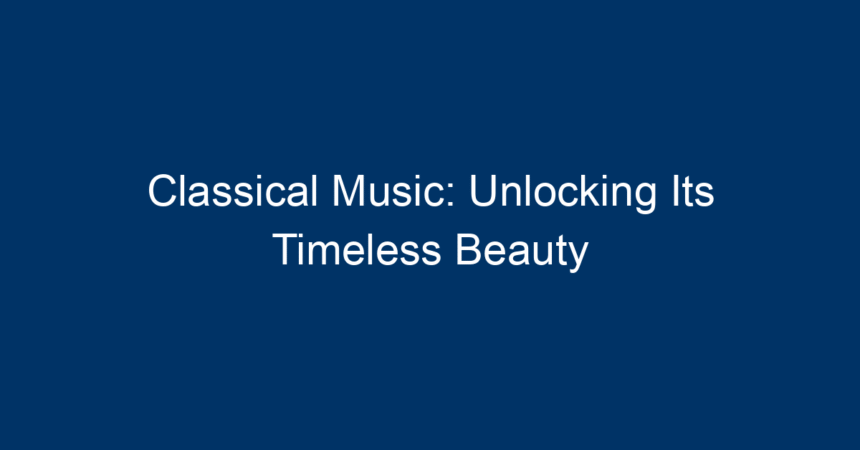Classical music is a treasure trove of emotion, sophistication, and culture that has stood the test of time. From soaring symphonies to intimate sonatas, this genre encapsulates a world of intricate melodies and profound narratives. Whether you’re a seasoned aficionado or a curious newcomer, understanding classical music can open your ears to a rich auditory landscape that resonates across generations. In this article, we’ll delve into the nuances of classical music, its historical significance, its emotional depth, and how you can embrace its beauty in everyday life.
The Historical Roots of Classical Music
The Birth and Evolution
Classical music, broadly defined, encompasses a range of styles that emerged primarily from the Western art music tradition, flourishing from the late Middle Ages to the present day. Its roots can be traced back as early as the 9th century with the establishment of Gregorian Chant, evolving through the Renaissance, Baroque, Classical, Romantic, and Modern periods.
-
Renaissance (1400-1600): Marked by the use of harmony and polyphony, composers like Josquin des Prez laid the groundwork for choral and instrumental music.
-
Baroque (1600-1750): Characterized by complex forms and grandeur, this period saw the emergence of notable composers like Johann Sebastian Bach and Antonio Vivaldi.
-
Classical (1750-1820): Aimed at clarity and balance, this era produced giants such as Wolfgang Amadeus Mozart and Joseph Haydn, focusing on structured forms like the sonata and symphony.
-
Romantic (1820-1900): Emphasizing individual emotion and passionate expression, composers like Chopin and Wagner revolutionized music, giving rise to truly personal works.
- Modern (1900-Present): This period has seen diverse styles, including minimalism, serialism, and electronic music, highlighting composers like Igor Stravinsky and John Cage.
From Court to Concert Hall
Initially, classical music was often performed in royal courts or churches, where patrons commissioned works. It gradually transitioned to the concert hall, democratizing the art form and allowing wider audiences to experience its beauty. This shift not only made classical music more accessible but also set the stage for its evolution into a global phenomenon.
The Emotional Depth of Classical Music
A Language of Feelings
One of the most enchanting aspects of classical music is its ability to evoke deep emotional responses. The intricate interplay of melody, harmony, and rhythm allows listeners to connect with the music on a visceral level. Whether it’s the triumphant crescendos of Beethoven’s Fifth Symphony or the somber introspection of Chopin’s Nocturnes, classical music speaks a universal language that transcends words.
Therapeutic Benefits
Research indicates that listening to classical music can have numerous mental health benefits. It has been linked to reducing stress, enhancing cognitive function, and even improving sleep quality. The serene melodies can be particularly effective for meditation, helping listeners attain a state of mindfulness.
Essential Composers and Works to Discover
The Titans of Classical Music
To truly appreciate the richness of classical music, one must familiarize themselves with its most influential composers. Here are a few recommendations:
-
Ludwig van Beethoven: A bridge between the Classical and Romantic eras, Beethoven’s compositions, like the "Moonlight Sonata," continue to resonate deeply with audiences.
-
Wolfgang Amadeus Mozart: Known for his melodic genius, pieces such as "The Magic Flute" and "Eine kleine Nachtmusik" showcase his unparalleled ability to craft memorable tunes.
-
Johann Sebastian Bach: Renowned for his intricate fugues, Bach’s works, including "Brandenburg Concertos" and "The Well-Tempered Clavier," are essential for understanding the foundations of classical music.
- Pyotr Ilyich Tchaikovsky: His evocative ballets—like "Swan Lake" and "The Nutcracker"—are not only staples in the concert repertoire but also integral to the world of dance.
Modern Composers
Classical music continues to evolve, with contemporary composers innovating within the genre. Notable figures include:
-
Philip Glass: A pioneer of minimalism, Glass’s works challenge traditional structures and invite listeners into hypnotic soundscapes.
- Tan Dun: Known for blending traditional Chinese instruments with Western orchestral styles, Dun’s compositions like the "Crouching Tiger, Hidden Dragon" score exemplify innovative fusion.
How to Embrace Classical Music in Daily Life
Integrating Music into Your Routine
Experiencing classical music doesn’t have to be confined to formal concerts or educational settings. Here are some practical ways to incorporate it into your everyday life:
-
Listening at Home: Create a serene atmosphere by playing classical music while you read, cook, or unwind after a long day. Platforms like Spotify and Apple Music offer curated classical playlists that suit various moods.
-
Attend Live Performances: Local orchestras and chamber groups frequently host performances in community centers and schools. Attending these events can provide a rich, shared experience with other music lovers.
- Explore Music Documentaries: There are many engaging documentaries on renowned composers and performances that can deepen your appreciation for classical music while providing historical context.
Music Education and Exploration
Consider taking the next step in your classical music journey by:
-
Taking Lessons: Whether it’s piano, violin, or another instrument, learning to play classical music can be incredibly rewarding and deepen your connection to the genre.
-
Participating in Community Programs: Many communities offer adult education classes or workshops focused on classical music appreciation, composition, or performance.
- Joining Music Clubs: Engage with others who share your passion for classical music through clubs or online forums where you can discuss favorite pieces, composers, and concert experiences.
Conclusion: Unlocking the Beauty of Classical Music
Classical music is more than mere entertainment; it is a timeless art form that captures the breadth of human emotion and creativity. By delving into its historical roots, exploring its emotional depth, and actively integrating it into your life, you can uncover a wealth of beauty and knowledge.
Whether you choose to attend a concert, listen to a new symphony, or even experiment with playing an instrument, classical music offers endless opportunities for exploration and enjoyment. Embrace it with an open heart and mind, and you will surely find that this cherished genre continues to inspire and uplift for generations to come.
Unlock the magic of classical music today and let it resonate in the soundtrack of your life!




